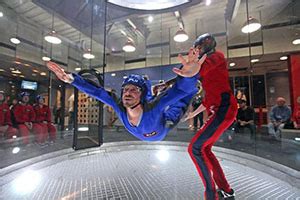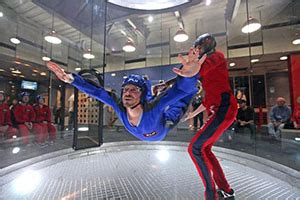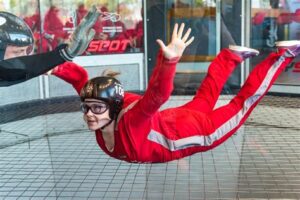Table of Contents
Indoor skydiving health restrictions are crucial for ensuring the safety and well-being of participants. This article provides an overview of the various health conditions and physical limitations that may prevent individuals from engaging in this exhilarating activity. From heart problems to pregnancy, knowing the restrictions can help potential flyers make informed decisions and guarantee a thrilling yet safe experience.
Indoor skydiving is an exhilarating experience that allows individuals to defy gravity and soar through the air in a controlled environment. However, before taking the leap, it is crucial to be aware of the health restrictions that may apply. Whether you are a seasoned adrenaline junkie or a first-time flyer, understanding these restrictions can ensure a safe and enjoyable experience. In this article, we will delve into the various health conditions and limitations that may prevent individuals from participating in indoor skydiving. So, fasten your seatbelts and let’s dive into the world of indoor skydiving health restrictions!
Introduction
Indoor skydiving has become a popular recreational activity that allows individuals to experience the thrill of flying without having to jump out of an airplane. It involves floating on a cushion of air within a vertical wind tunnel, simulating the sensation of freefalling. While indoor skydiving is generally safe, there are certain health restrictions that must be considered to ensure the well-being of participants.
Age Limitations
Due to the physical demands and potential risks associated with indoor skydiving, there are age limitations in place. Most facilities require participants to be at least three years old to fly. This restriction ensures that individuals have developed the necessary motor skills and coordination to safely engage in the activity. Additionally, minors under the age of 18 usually need parental consent to participate.
Weight Restrictions
Another important health restriction for indoor skydiving is weight limitations. The wind tunnel’s airflow needs to support the weight of the participant to ensure stability and control during the experience. Different facilities may have varying weight restrictions, but typically, the maximum weight limit for participants ranges from 230 to 300 pounds. These restrictions are in place to prevent any potential strain on the wind tunnel’s equipment and ensure the safety of all participants.
Medical Conditions
Individuals with certain medical conditions may be restricted from participating in indoor skydiving due to potential health risks. These conditions can include heart problems, high blood pressure, respiratory issues, back or neck injuries, and recent surgeries. It is crucial to consult with a healthcare professional before engaging in indoor skydiving if you have any pre-existing medical conditions to ensure it is safe for you.
Pregnancy
Pregnant women are generally advised against participating in indoor skydiving due to the potential risks it may pose to both the mother and the baby. The rapid changes in air pressure and the physical exertion involved in the activity can be detrimental during pregnancy. It is always better to prioritize the health and well-being of both the mother and the unborn child by refraining from indoor skydiving until after delivery.
Disclosed Injuries
If you have recently suffered from an injury, it is essential to disclose this information to the staff at the indoor skydiving facility. Depending on the nature of the injury, you may be restricted from participating until you have fully recovered. This precaution ensures that the injury does not worsen or cause complications during the activity.
Asthma and Respiratory Conditions
Individuals with asthma or other respiratory conditions need to consider their health restrictions before engaging in indoor skydiving. The increased airflow and potential exposure to irritants in the wind tunnel can trigger breathing difficulties or exacerbate existing respiratory issues. It is advisable to consult with a healthcare professional and follow their advice regarding participation in such activities.
Physical Fitness
Indoor skydiving requires a certain level of physical fitness and strength to maintain stability and control while floating in the wind tunnel. Participants should have a reasonable level of overall body strength, coordination, and flexibility. Engaging in regular exercise and maintaining a healthy lifestyle can help individuals meet these physical requirements and fully enjoy the experience.
Emotional and Mental Health
Although not a direct health restriction, it is important to consider the emotional and mental well-being of participants before engaging in indoor skydiving. The activity can induce feelings of fear, anxiety, or panic in some individuals. It is crucial to assess your comfort level with heights, enclosed spaces, and the overall sensation of freefall before deciding to participate. If you have any concerns or reservations, it is best to discuss them with the staff or a mental health professional.
Conclusion
Indoor skydiving provides an exhilarating experience for individuals seeking adventure and a taste of the sky. However, it is essential to be aware of the health restrictions associated with this activity. Adhering to age limitations, weight restrictions, and considering medical conditions, pregnancy, injuries, asthma, physical fitness, and emotional well-being will ensure a safe and enjoyable experience for all participants. Always prioritize your health and consult with professionals when in doubt, allowing you to make informed decisions about your participation in indoor skydiving.
Indoor Skydiving Health Restrictions
When it comes to participating in indoor skydiving, there are several health restrictions that individuals need to be aware of. These restrictions are put in place to ensure the safety and well-being of all participants. It is important to understand and abide by these limitations before engaging in this thrilling activity.
1. Age Limitations
One of the primary health restrictions for indoor skydiving is age. Participants must be a minimum of 3 years old to take part in this exhilarating experience. However, for children aged 3 to 17, written consent from a parent or legal guardian is required to ensure their safety and proper supervision throughout the activity.
2. Weight Limitations
Weight restrictions are also in place to maintain a safe and stable flight experience. Participants must weigh less than 300 pounds (136 kilograms) to ensure proper airflow and stability during their indoor skydiving session. This limit is crucial to prevent any complications that may arise due to excessive weight.
3. Medical Conditions
Individuals with pre-existing medical conditions need to take extra precautions before engaging in indoor skydiving. Those with heart problems, high blood pressure, back or neck injuries, epilepsy, or who are pregnant are advised to consult with their healthcare provider beforehand. This consultation will help determine if they are physically fit to participate in this high-intensity activity.
4. Recent Surgery or Injury
If an individual has recently undergone surgery or sustained any injuries, they may require additional clearance from their doctor before participating in indoor skydiving. This is particularly important if the surgery or injury affects the neck, back, or limbs. The safety and well-being of the participant should always be the top priority.
5. Respiratory Issues
Individuals with respiratory conditions such as asthma or chronic obstructive pulmonary disease (COPD) should consult with their healthcare provider before attempting indoor skydiving. The high-speed wind experienced during the activity may exacerbate these conditions and pose a risk to the participant’s health.
6. Motion Sickness
For those who are prone to motion sickness or vertigo, it is important to take necessary precautions or consult with a healthcare provider before engaging in indoor skydiving. The sensation of weightlessness and the speed of the wind may trigger symptoms of motion sickness or vertigo, affecting the overall experience.
7. Psychological Limitations
People with severe anxiety, panic disorders, claustrophobia, or other psychological conditions that may be exacerbated in confined or high-intensity situations should carefully consider their comfort levels and consult with a mental health professional before attempting indoor skydiving. It is essential to prioritize mental well-being and ensure a safe and enjoyable experience for all participants.
8. Clothing and Gear
In addition to the health restrictions mentioned above, participants must also adhere to specific clothing and gear requirements. Comfortable clothing, preferably athletic attire without hoods, scarves, or loose items that could become entangled in the wind or equipment, should be worn. Suitable footwear, such as athletic shoes, with secure fastenings is crucial to ensure stability and safety during the activity. Moreover, all loose jewelry should be removed before participating to minimize the risk of injuries.
It is of utmost importance to respect and abide by these indoor skydiving health restrictions. They are put in place to safeguard the well-being of all participants and maintain a safe environment for this thrilling activity. By understanding and following these limitations, individuals can enjoy the excitement of indoor skydiving while minimizing any potential risks or complications.
Point of View:
As an Indoor Skydiving instructor, it is crucial to ensure the safety and well-being of our participants. In order to achieve this, we have certain health restrictions in place that must be followed by all individuals who wish to experience the thrill of indoor skydiving. These restrictions are designed to protect both the participant and our staff, and we appreciate your understanding and cooperation in adhering to them.
Voice and Tone:
The voice and tone used in the instructions regarding health restrictions for indoor skydiving should be informative and authoritative, while maintaining a friendly and approachable demeanor. It is important to strike a balance between providing clear instructions and conveying a sense of excitement for the activity.
Instructions:
-
Medical Conditions: For your safety, individuals with the following medical conditions are advised not to participate in indoor skydiving:
- Heart problems or cardiovascular diseases
- High blood pressure
- Pregnancy
- Back or neck injuries
- Recent surgeries
- Epilepsy or seizures
- Respiratory conditions, such as asthma
-
Age Restrictions: Indoor skydiving is an exhilarating activity suitable for individuals of various age groups. However, there are some age restrictions in place:
- Children under the age of 3 are not permitted due to safety reasons.
- Children between the ages of 3 and 17 must be accompanied by a legal guardian or parent who will sign the necessary waivers.
-
Weight and Size Limitations: To ensure a safe and enjoyable experience, we have weight and size limitations in place:
- Participants must weigh less than 300 pounds (136 kg).
- Height restrictions may also apply, depending on the specific design of our facilities. Please consult our staff for more information.
-
Intoxication: For safety reasons, individuals under the influence of alcohol, drugs, or any other substances that impair judgment or coordination are strictly prohibited from participating in indoor skydiving.
-
Dress Code: We recommend wearing comfortable clothing, such as athletic wear, and avoiding loose accessories such as jewelry or belts that could pose a safety risk during the activity.
-
Consultation: If you have any concerns or questions regarding your eligibility to participate in indoor skydiving based on your health condition, please consult with your physician beforehand.
We appreciate your cooperation in following these health restrictions and guidelines. Our primary concern is your safety and ensuring that you have an unforgettable and thrilling experience while indoor skydiving. If you have any additional questions or need further clarification, our knowledgeable staff will be more than happy to assist you.
Thank you for visiting our blog and taking the time to read about indoor skydiving health restrictions. We understand that you may be eager to experience the thrill of indoor skydiving, but it is crucial to consider certain health factors before taking the leap. In this closing message, we would like to emphasize the importance of prioritizing your safety and well-being above all else.
First and foremost, it is essential to note that indoor skydiving involves a certain level of physical exertion and can put strain on your body. Therefore, individuals with pre-existing medical conditions such as heart problems, high blood pressure, or respiratory issues should consult their healthcare provider before attempting indoor skydiving. Your health professional will be able to assess whether you are physically fit enough to engage in such activities and provide specific guidelines tailored to your condition.
Furthermore, even if you do not have any underlying health concerns, it is still advisable to have a general level of fitness and strength. Indoor skydiving requires coordination, balance, and core stability, which can be challenging for individuals who lead a sedentary lifestyle. Engaging in regular exercise and incorporating activities that improve your overall fitness can help prepare your body for the demands of indoor skydiving. Remember, it is always better to be proactive and take steps to ensure you are physically capable of participating in this exhilarating experience.
In addition to physical health considerations, it is also important to be aware of any age restrictions that may apply to indoor skydiving. While many facilities allow participants as young as three years old, there may be height and weight requirements for younger individuals. These restrictions are in place to ensure the safety of all participants and provide them with an enjoyable experience. Therefore, it is essential to check with the specific indoor skydiving facility regarding their age limitations and any accompanying adult supervision requirements.
Ultimately, our main goal is to inform and educate our readers about the health restrictions associated with indoor skydiving. Your safety and well-being should always be paramount when engaging in any physical activity. We encourage you to thoroughly assess your health status, consult with medical professionals if necessary, and make an informed decision before embarking on this thrilling adventure. Remember, taking care of yourself is the first step towards enjoying a lifetime of exhilarating experiences!
.
People Also Ask About Indoor Skydiving Health Restrictions:
-
Are there any age restrictions for indoor skydiving?
-
Can people with heart conditions go indoor skydiving?
-
Are there weight restrictions for indoor skydiving?
-
Can pregnant women try indoor skydiving?
-
Are there any health restrictions for people with respiratory conditions?
Yes, there are age restrictions for indoor skydiving. Most indoor skydiving facilities require participants to be at least 3 years old. However, some facilities may have a minimum age requirement of 4 or 5 years old. It is important to check with the specific facility you plan to visit for their age restrictions.
Individuals with heart conditions or any other serious medical conditions should consult with their doctor before attempting indoor skydiving. The high-speed winds and physical exertion involved in the activity can put strain on the cardiovascular system. It is essential to prioritize your health and safety and seek professional medical advice before participating.
Yes, there are usually weight restrictions for indoor skydiving due to safety concerns. The weight limits can vary depending on the facility and the type of equipment used. Typically, individuals weighing over 250 pounds (113 kilograms) may face limitations or additional requirements. It is advisable to contact the indoor skydiving facility beforehand to inquire about their specific weight restrictions.
No, it is generally not recommended for pregnant women to participate in indoor skydiving. The activity involves strong air currents and sudden changes in body position, which can potentially put stress on the developing fetus. Pregnant women should prioritize the well-being of themselves and their unborn child and avoid activities that may pose any risks.
Individuals with respiratory conditions, such as asthma or chronic obstructive pulmonary disease (COPD), should consult with their healthcare provider before attempting indoor skydiving. The high-speed winds and changes in air pressure during the activity can potentially trigger respiratory symptoms or exacerbate existing conditions. It is crucial to assess your health condition and take appropriate precautions under medical guidance.
Please note that these are general guidelines, and it is always recommended to consult with a medical professional to evaluate your personal health situation before engaging in any physically demanding activities like indoor skydiving.






